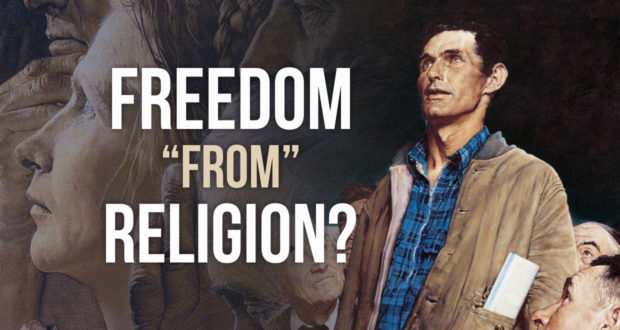Whenever the idea of freedom of religion comes up, someone invariably mentions that it includes ‘freedom from religion’. In the view of many, the right to freedom from religion is at least as important as freedom of religion. But what exactly does freedom from religion mean?
There are certain senses in which I favor freedom from religion. I don’t think anyone should be required to join or attend a certain church, or that anyone should be required by the government to make direct payments to a certain church (or to any church).
I don’t think that anyone should be required by government to follow church laws and regulations, such as being prohibited from eating meat on Friday or even having to be married according to church laws before the state would recognize the marriage. In other words, freedom from religion should mean that you are never directly required to participate in the religious life of a particular church or of any church. I think that type of freedom from religion is perfectly consistent with the First Amendment, natural law, right reason, and the teachings of the Catholic Church.
What the wider culture currently means by freedom from religion is not my definition at all. The wider culture now holds that freedom from religion means that the beliefs of religious people must not be allowed to have any impact whatsoever on anyone else.
Imposing Religious Views?
You can see this in the reaction to the Hobby Lobby decision. The majority of the court in the Hobby Lobby case said that the government cannot force employers to provide benefits to their employees which violate the business owner’s beliefs. The decision was consistent with both the First Amendment and the Religious Freedom Restoration Act, which says that the government may not impose burdens to religious practice unnecessarily.
Since there are many options for the government to provide contraceptives to women without forcing employers to pay for it, the Obamacare regulations trying to force employers to pay for birth control clearly violated the law.
The argument was made, though, that allowing employers to choose not to provide certain benefits gives companies (in the words of the New York Times) “an unprecedented right to impose their religious views on employees.” This is factually tenuous, since Hobby Lobby was not prohibiting the use of birth control, merely declining to pay for it.
But consider the underlying argument: if your religious beliefs prevent you from paying for what I want, then you have imposed your religious beliefs on me. Or, more generally, if your religious beliefs lead you to act in a way that impacts me, even a little, then you are forcing your beliefs on me.
Once you start going down that road, where does it end? If that standard were universally applied, it would allow for religious freedom only in those cases in which religious beliefs had no impact on anyone else. You probably would be all right going into your room and praying. But what if your religious beliefs caused you to teach your children at home? That would have quite a large impact on others. It would certainly impact your local school system, which would lose funds it otherwise would have had.
According to the logic of the Hobby Lobby dissenters, if you don’t put your children into public school for religious reasons, you are imposing your religious beliefs on that school, which is losing money because of your beliefs.
Inherent Contradiction
Religious beliefs, if they are truly and deeply held, will almost always influence how someone lives. It will influence with whom they associate, what products they purchase, what things they watch, and how they think about public policy issues. If the Hobby Lobby dissenters are correct, then many times every day, by the decisions they make and the attitudes they hold, religious believers are violating the rights of others to be free from religion.
This freedom from religion standard is a strange right to claim. If the Constitution includes this freedom from right, then does it include other freedom from rights?
When the Constitution guarantees freedom of speech, does it also guarantee freedom from speech? Do people have an inherent right to be protected from the speech of others, so that no one would have a right to speak if anyone else objected to hearing it? Or how about freedom of assembly? Does that right only pertain when the assembly does not inconvenience anyone else?
When you think about freedom from, it’s obvious that giving others freedom from being impacted in any way by your rights means that you don’t have any rights. It gives the heckler’s veto to anyone who objects to your rights. This inherent contradiction is why no one speaks of a right to freedom from speech. A standard of absolute freedom from religion destroys true religious freedom just as surely as freedom from speech would destroy free speech.
Freedom of religion, at least any kind of freedom of religion that is worth having, cannot coexist in a society that recognizes an absolute freedom from religion. We are fortunate that a bill to overturn the Hobby Lobby decision, in essence to institutionalize the right of freedom from religion, failed in the Senate.
We must now work and pray in order to keep our God-given and Constitutionally-recognized freedoms.
Header Image CC Copyright Norman Rockwell Museum

 Seton Magazine Catholic Homeschool Articles, Advice & Resources
Seton Magazine Catholic Homeschool Articles, Advice & Resources
